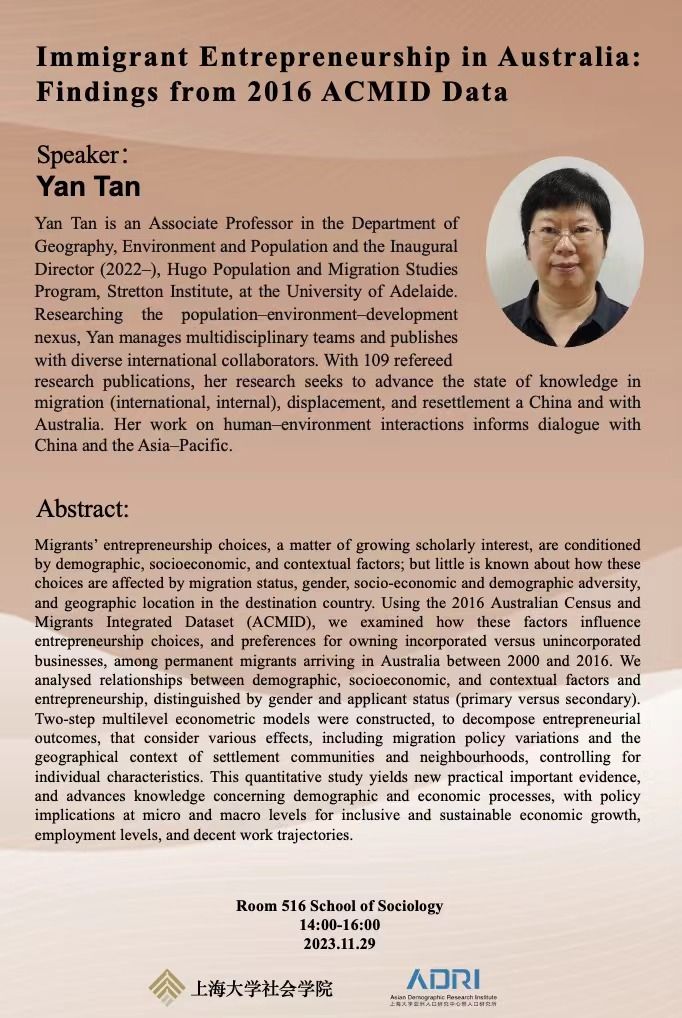
2023年第48讲总第799讲
题目:Immigrant Entrepreneurship in Australia: Findings from 2016 ACMID Data(澳大利亚移民创业:来自2016年ACMID数据的发现)
地点:社会学院516
时间:2023年11月29日14:00-16:00
主讲人:Yan Tan is an Associate Professor in the Department of Geography, Environment and Population and the Inaugural Director (2022–), Hugo Population and Migration Studies Program, Stretton Institute, at the University of Adelaide. Researching the population–environment–development nexus, Yan manages multidisciplinary teams and publishes with diverse international collaborators. With 109 refereed research publications, her research seeks to advance the state of knowledge in migration (international, internal), displacement, and resettlement within China and with Australia. Her work on human–environment interactions informs dialogue with China and the Asia–Pacific.
谭燕,澳大利亚阿德莱德大学斯特莱顿研究所地理、环境与人口系副教授,雨果人口与移民研究项目首任主任(2022年至今)。研究人口-环境-发展的关系,管理多学科团队,并与不同的国际合作者发表文章。她发表了109篇论文,她的研究旨在推动中国和澳大利亚移民(国际、国内)、迁移和移民安置方面的知识。她在人与环境互动方面的工作为与中国和亚太地区的对话提供了信息。
内容简介:Migrants’ entrepreneurship choices, a matter of growing scholarly interest, are conditioned by demographic, socioeconomic, and contextual factors; but little is known about how these choices are affected by migration status, gender, socio-economic and demographic adversity, and geographic location in the destination country. Using the 2016 Australian Census and Migrants Integrated Dataset (ACMID), we examined how these factors influence entrepreneurship choices, and preferences for owning incorporated versus unincorporated businesses, among permanent migrants arriving in Australia between 2000 and 2016. We analysed relationships between demographic, socioeconomic, and contextual factors and entrepreneurship, distinguished by gender and applicant status (primary versus secondary). Two-step multilevel econometric models were constructed, to decompose entrepreneurial outcomes, that consider various effects, including migration policy variations and the geographical context of settlement communities and neighbourhoods, controlling for individual characteristics. This quantitative study yields new practical important evidence, and advances knowledge concerning demographic and economic processes, with policy implications at micro and macro levels for inclusive and sustainable economic growth, employment levels, and decent work trajectories.
移民的创业选择受到人口、社会经济和背景因素的制约正逐渐引起学术界的兴趣;但对于这些选择如何受到移民身份、性别、社会经济和人口逆境以及目的地国地理位置的影响,人们知之甚少。利用2016年澳大利亚人口普查和移民综合数据集(ACMID),我们研究了这些因素如何影响2000年至2016年间抵达澳大利亚的永久移民的创业选择,以及在拥有公司与非公司企业的偏好。我们分析了人口、社会经济和背景因素与创业之间的关系,并根据性别和申请人身份(小学与中学)对其进行区分。我们构建了两步多层次的计量经济模型来分解创业结果,该模型考虑了各种影响,包括移民政策变化和定居社区和邻里的地理环境,并控制了个体特征。这项定量研究提供了新的重要实证证据,并加深了有关人口和经济进程的知识,以及政策在宏观层面和微观层面上对包容性和可持续经济增长、就业水平和体面工作轨迹的影响。


